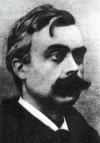Biography
Other info : Bibliography
Léon Bloy , was a French novelist, essayist, pamphleteer and poet.
Bloy was born in Notre-Dame-de-Sanilhac, in the arondissement of Périgueux, Dordogne. He was the second of six sons of Voltairean freethinker and stern disciplinarian Jean Baptiste Bloy and his wife Anne-Marie Carreau, pious Spanish-Catholic daughter of a Napoleonic soldier.[1] After an agnostic and unhappy youth[2] in which he cultivated an intense hatred for the Roman Catholic Church and its teaching,[1] his father found him a job in Paris, where he went in 1864. In December 1868, he met the aging Catholic author Barbey d'Aurevilly, who lived opposite him in rue Rousselet and became his mentor. Shortly afterwards, he underwent a dramatic religious conversion.
Bloy's works reflect a deepening devotion to the Catholic Church and most generally a tremendous craving for the Absolute. His devotion to religion resulted in a complete dependence on charity; he acquired his nickname ("the ungrateful beggar") as a result of the many letters requesting financial aid from friends, acquaintances, and complete strangers, all the while carrying on with his literary work, in which his eight-volume Diary takes an important place.
Bloy was a friend of the author Joris-Karl Huysmans, the painter Georges Rouault, and the philosophers Jacques and Raissa Maritain, and was instrumental in reconciling these intellectuals with Roman Catholicism. However, he acquired a reputation for bigotry because of his frequent outbursts of temper; and his first novel, Le Désespéré, a fierce attack on rationalism and those he believed to be in league with it, made him fall out with the literary community of his time and even many of his old friends. Soon, Bloy could count such prestigious authors as Émile Zola, Guy de Maupassant, Ernest Renan, Alphonse Daudet, Joris-Karl Huysmans, Paul Bourget and Anatole France as his enemies.
In addition to his published works, he left a large body of correspondence with public and literary figures. He died in Bourg-la-Reine.Bloy is quoted in the epigraph at the beginning of Graham Greene's novel The End of the Affair, and in the essay "The Mirror of Enigmas", by the Argentine writer, Jorge Luis Borges, who acknowledged his debt to him by naming him in the Foreword to his short story collection "Artifices" as one of seven authors who were in "the heterogeneous list of the writers I am continually re-reading". In his novel The Harp and the Shadow, Alejo Carpentier excoriates Bloy as a raving, Columbus-defending lunatic during Vatican deliberations over the explorer's canonization. Bloy is also quoted at the beginning of John Irving's A Prayer for Owen Meany, and there are several quotations from his Letters to my Fiancée in Charles Williams's anthology The New Christian Year.[3] Le Désespéré was republished in 2005 by Editions Underbahn with a preface by Maurice G. Dantec. Pope Francis quoted Bloy in his inaugural address to the cardinal electors after his election in 2013, saying "Anyone who does not pray to the Lord prays to the devil."






